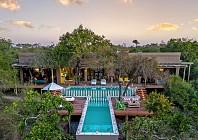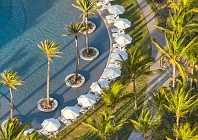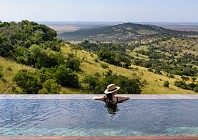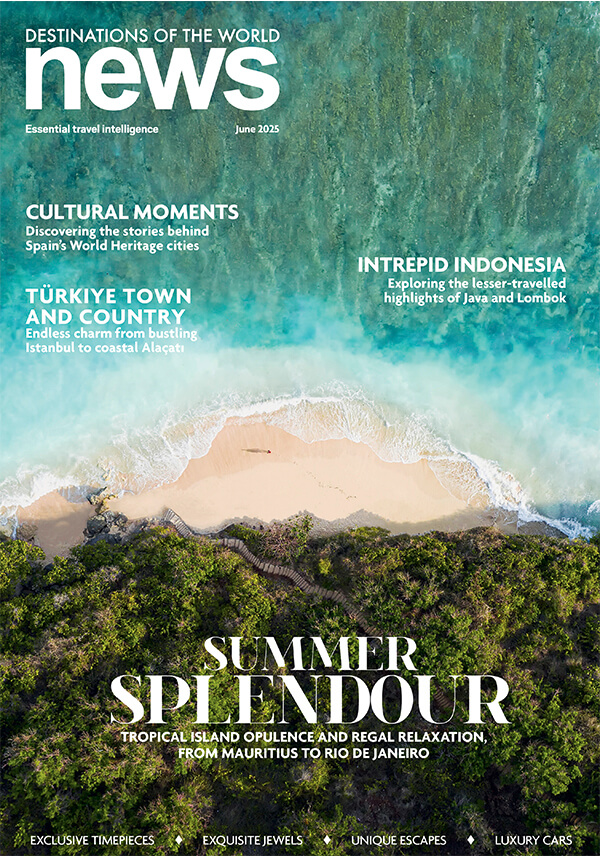 Forty years after it was nationalised and almost run out of business by Idi Amin, Uganda’s Madhvani Group is very much back in business and playing an increasingly important role in developing East Africa’s luxury travel infrastructure.
Forty years after it was nationalised and almost run out of business by Idi Amin, Uganda’s Madhvani Group is very much back in business and playing an increasingly important role in developing East Africa’s luxury travel infrastructure.
Madhvani Group owns three luxury safari lodges in Uganda through subsidiary company Marasa Holdings – how important is tourism to your overall business?
Our vision to share our breathtaking country with those from beyond our borders led us to acquire and develop what we felt to be locations of outstanding natural beauty in Uganda. Each of these properties represents the very best of what there is to offer at these destinations. Having ventured into the hospitality business over a decade and half ago, this has become one of our key areas of focus in terms of growth.
You used to head up the Uganda Tourism Board – how important is tourism for Uganda’s economic growth from the government’s perspective?
There is national and governmental consensus in terms of the importance of tourism and its contribution to Uganda’s economic growth. Unfortunately however, as a country we have been unable to walk the talk and invest sufficiently in marketing Uganda on the international platform to date. Hopefully that awakening will come in the near future. The tourism sector in Uganda has yet to realise its latent potential and there is a need to put in place some infrastructural prerequisites such as developing internal air travel and better roads to the centres of activities and so on.
What would you say is the main appeal of Uganda as a destination?
Uganda still remains off the beaten track, which is great for the discerning traveller, as it still remains unspoilt and not commercialised. Uganda is a unique experience for the visitor who is looking for that something special, having possibly ‘done’ other African destinations.
When on safari in Uganda, you probably won’t be surrounded by a dozen other minibuses when you spot a pride of lions. Uganda is not a mass-market destination, so it remains waiting to be discovered as a unique and unspoilt destination. By default, the visitor can be assured of a more personal, individual and less commercialised experience.
What sets Uganda apart from other East African safari destinations like Kenya or Tanzania?
Every country is different and special in its own way. The Ugandan experience is different in that it is far more nebulous in terms of what is on offer, ranging from gorilla and chimpanzee trekking, the truly unique water safaris, white water rafting, the largest number of ornithological sightings on the continent, mountaineering on the snow capped peaks of the Mountains of the Moon (The Rwenzoris), the amazingly friendly people, the temperate climate and so much more.
To what extent have the problems caused in the wake of Idi Amin’s regime and the subsequent civil war been resolved?
Unfortunately our past, when it comes to marketing ourselves as a destination, does keep showing its ugly head. However for the last two decades there has been significant progress and the conflict in the north was brought to an end over five years ago, allowing the northern region to enjoy the situation of total peace that the rest of the country had been enjoying for sometime. This situation has restored confidence in our country and this is essential for development and progress. Any nation that undergoes such a conflict is left with the scars and in Uganda it is no exception.
How will the rush to claim a share of Uganda’s natural resources impact the growth of tourism?
The scramble for the entire continent’s resources is underway, and it is present in Uganda too. The wealth that arises from this will be key to take the continent’s population out of the cycle of poverty through development – if it is carefully administered.
In the case of Uganda, oil was recently discovered in the Albertine Rift Valley, which is also where our important national parks are. Given the importance of the extraction of petroleum to the nation, it must and will be developed in conjunction with respect for our national resources. There is no reason why tourism will not continue to grow from strength to strength.
Furthermore the stakeholders in the petroleum sector are listed in the important global exchanges and therefore are fully aware of the needs of taking into consideration environmental issues, through corporate governance.
Madhvani Group recently invested in several safari lodges outside of Uganda – do you plan to continue expanding?
In late 2011 we acquired three properties in Kenya, including the Ark and the Aberdare Country Club, which are heritage properties associated with the early days of tourism in the region, and the Mara Leisure Camp, a property on the Mara reserve. All these are currently undergoing renovation to make them unique and charming properties that maintain their historic feel. We hope to grow further within Kenya and beyond into the rest of the region to offer high quality, comfortable, charming safari lodges through out East Africa.
What advice would you give anyone thinking of visiting Uganda?
I would recommend anyone interested in Uganda to contact a specialist operator who can put together a trip of a lifetime based on one’s individual interests rather than going for the normal packages. And possibly ask to do some of the non-tourist things like visit or meet people involved in the things that may interest you such as checking out the record number of donor funded projects or micro finance institutions.










